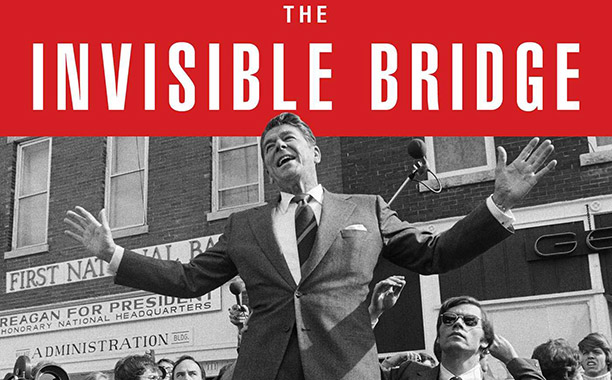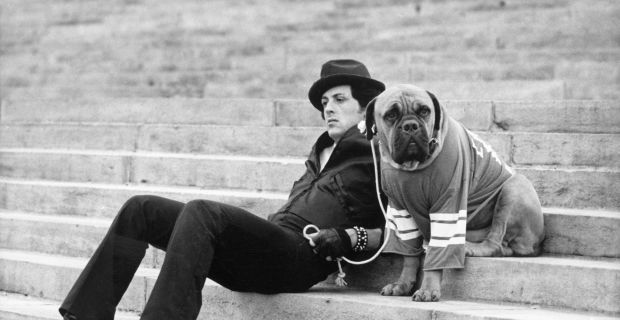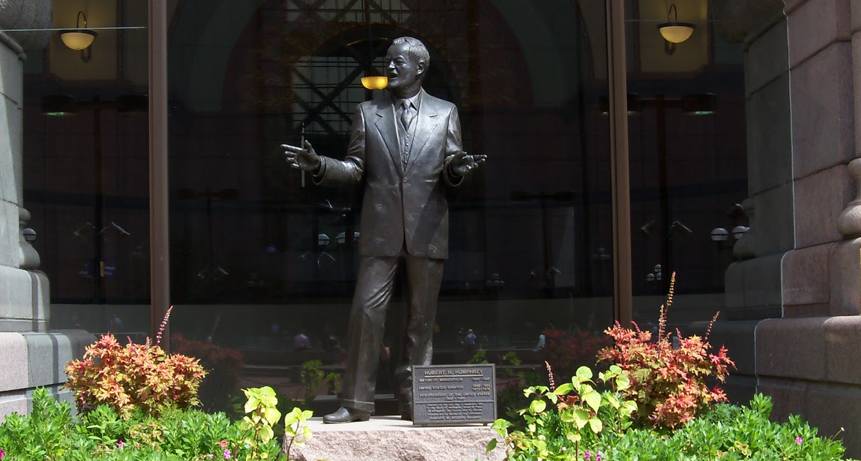Tuesday December 02, 2014
'Invisible Bridge' Author Rick Perlstein on 'Rocky,' 'Roots,' and Whether Reaganism Needed Reagan

A few weeks ago I Skyped an interview with Rick Perlstein, author of a series of acclaimed books on the rise of the far right in America: “Before the Storm: Barry Goldwater and The Unmaking of the American Consensus,” “Nixonland: The Rise of a President and the Fracturing of America,” and now “The Invisible Bridge: The Fall of Nixon and the Rise of Reagan.” You can see video of the interview here. What follows is the transcript of that interview, edited and condensed.
Q: Two threads seem to work their way through “The Invisible Bridge.“ One is how the various crises of the 1970s—Vietnam, Watergate, oil—give us the opportunity to reckon with the less palatable aspects of our history, and to mature, hopefully. The other is the rise of Ronald Reagan, who, for his entire life, did the opposite: reduced moral complexity to moral simplicity. So do we blame Reagan for blunting this opportunity for us as a country to mature?
Perlstein: Well, you know Erik, they make me put those Presidents on the cover of the books because they sell. The books are really about us, the electorate. I’m interested in why we choose these people. Why we rescue them from obscurity and turned them into our leaders. I’m really influenced by John MacGregor Burns, the late political scientist. He wrote this big book called “Leadership,” and it’s basically a whole book about how leaders emerge when these powerfully charismatic people match the unconscious longings of a national public.
So it’s not just Reagan. The book is about a confrontation between those two ways of thinking about America. Throughout, there’s this debate going on between the people who are saying, “Look, we need to change course and think about America’s role in the world in a different way,” and the people who are saying, “America’s the best country in the world, and always has been and always will be.” Even if Reagan had never been born, we still would’ve had, for example Gerald Ford a few months after the fall of Saigon, drumming up this “Remember the Maine” fake patriotic event of the Mayaguez—where he sends out a military mission to supposedly rescue these merchant seaman who didn’t need rescuing. He sends in B-52s and a Normandy-style invasion of some North Vietnamese island beach that ends up killing more American serviceman than the supposed merchant seaman they rescued. And he suddenly finds himself hailed as the new Caesar. Magazine covers are saying “America’s got its mojo back.”
It’s not just Reagan. It’s us.
Q: One reason I find this book particularly fascinating is that it mirrors in politics what I’ve observed in the movie industry. From about 1967 to 1977, our most popular movies were fairly morally complex. “The Godfather” was the No. 1 movie in 1972. “One Flew over the Cuckoo’s Nest was the No. 2 movie of 1975. Adjust for inflation, and it grossed around $450 million.
Perlstein: I wish I had known that a few years ago, Erik.
Q: And it’s about a bunch of guys in a mental institution who rebel against...
Perlstein: Authority.
Q: Exactly. If it were made today it would get a limited release in New York, and LA.
Perlstein: Then comes “Jaws,” and then comes “Star Wars.”
Q: Well, “Rocky” was, I guess, the invisible bridge between those two. For awhile, we didn’t need the Hollywood ending in movies. “Rocky” began that change.
Perlstein: Right. It was all the sentiment that the public [at the time] could credibly stomach. He couldn’t win at the end—that was just too much.
Q: So he went the distance. The first half almost looks like a 1970s movie. Very gritty. A down-and-out guy with mob connections; then it just turns into the feel-good story we all know.
Perlstein: Do you know Jefferson Cowie’s book “Staying Alive”? You’ll enjoy that a great deal. It’s a history of the working class in the ‘70s but brilliant stuff on “Rocky,” which was based on a real guy, Chuck Wepner. I didn’t write about it, but I will in the next book. The racial politics are fascinating because it was Don King basically saying, “Let’s give them a chance.” So he rescues this club fighter from Philadelphia, Chuck Wepner, from obscurity, sets him up as a sparring partner for Ali, and he goes the distance. Sylvester Stallone watched the Wepner fight on close-circuit TV, and in an amphetamine-fueled binge wrote the screenplay in like six straight hours. It was based on Wepner and the racial politics of the ‘70s—in which white guys were suddenly seeing themselves as objects of pity.

The great (sshhh) white hope.
Q: Eddie Murphy does great stuff on that in his comedy routines in the ‘80s.
Perlstein: Do you remember the jokes?
Q: Basically they're about the Italian guy at the movie theater who carries the “Rocky” fantasy out into the lobby.
Perlstein: For my next book I’ll have to figure out a way to work it in. I believe I recall reading somewhere that white guys hopped up on Rocky were committing hate crimes. And in the same way ... I remember sitting in the basement of the Renaissance bookstore in Milwaukee when I was 16 and reading Time magazine, and learning that when “Roots” came out, white kids were beating up black kids because they saw it as degraded slaves and black kids were beating up white kids because they saw them as sadistic masters. I’m fascinated by these kinds of divisions.
But the real story in “Roots”—that’s salient for my work—is you would think it would’ve inspired this great reckoning with America’s moral past. The same way Vietnam would inspire a reckoning with America being a policeman of the world and Watergate would inspire this reckoning with our reverence for our leaders. No. What it inspired was this genealogy fad in which white people wanted to do what Alex Haley did. There’s a whole book about it by this Harvard professor called “Roots, Too.” It’s like, “We have roots too!” It was in a way very reactionary. People tried to locate their own oppressed pasts, so they could claim the moral status as victims too. That’s a very Reagan movement.
Q: So I suppose the question isn’t why we returned to moral simplicity in the mid-’70s, but how we got interested in moral complexity in the first place.
Perlstein: That kind of goes unexamined in the book, but I think this was a product of the ‘60s generation. When I talk about the ‘60s generally, this gets into a paradox. We were the most prosperous society in history—you could burn down a building one day and show up in a suit for a job at IBM the next—because there was so much work and so much prosperity. So I think people had the confidence to be able to think about these kinds of difficult questions.
But the paradox is, by the ‘70s, even that prosperity dribbles away, and you just begin to see this very dark reckoning with broken institutions. It’s like here’s this very American pastime of driving your giant car as far as it’ll go and suddenly the price of fuel quadruples because of the inscrutable actions of oil sheiks 10,000 miles away. People didn’t even think of petroleum as a commodity. It was just there, like the air and the water.
Q: Right. And scary. If you’d told me back then that gas would still be available and relatively cheap in 2014, I wouldn’t have believed you.
Perlstein: Right. A lot of the success of Reaganism drafted on the exaggeration of the apocalyptic fears: we’re going to be eating leaves and grass and nuts and berries. One of the inanities of George Will as a climate change denier is that he’s able to go up on TV every week, on ABC, and say “Well in the ‘70s they were worried about global cooling.” Well, in the 70s they were worried about everything. You could write a book about any kind of apocalyptic theory and get a reasonable audience.

'70s books: We've seen the future and it sucks.
Q: What’s your methodology in researching and writing these books? Do you just focus on a particular subject, like Patty Hearst, and read as much as you can about her?
Perlstein: It’s divided into two things. One is, yes, I know the big signposts and themes, like Patty Hearst, and research them in very specific ways: books, videos, films, whatever. But the other is very improvisational. I try to consume the kind of media that people in the time would consume. A lot of it is a stratified sample, right? It’s like I can’t read every newspaper every day. But, for example, doing my research now, I’ll do a search in a newspaper database for any time Ronald Reagan was mentioned in an article in 1977. When you do that you get a pretty good sample of all sorts of political articles. That helps fill in what the narrative is.
Of course, I do have to learn things that are completely unexpected.
In the case of articles about Ronald Reagan in 1976 and 1977, of course there’s the issue of age. Is he going to run for President or is he too old? But he’s obviously making a bid for leadership of the Republican Party; and the first thing he has to do is deny that it’s his fault that Ford lost. It turns out that he basically boycotted campaigning for the Republican ticket in 1976. Whenever he gave a speech, he would almost never mention Ford, but he would mention the great Republican platform. Of course, the Republican platform was one that his followers forced on the party. So there are all sorts of fascinating politics around that.
Suddenly the storyline fills itself out. The first thing Reagan has to do is re-establish his credibility as a good Republican. That takes me in a direction. Suddenly I have the beginnings of an outline. History is about chronology—one thing follows another and there’s cause and effect—and tracing out those lines of causality, that’s how the content builds out to form, and the form is indicative of the content.
Q: As for consuming the media that we consumed at that time: Can you do that today and write the kinds of books you write, or are we too fragmented as a society? Back then we had national meeting places. We all visited with Walter Cronkite. Today? Not so much.
Perlstein: Well, it’s organized pretty nicely, right? It’s all automated. The proliferation of media can be very deceiving: Are there a million stories out there, or just there are a million versions of the same story? We had a pretty effective top-down propaganda campaign that got us into the war in Iraq. It didn’t seem like any of the powers-that-be had any trouble just instantiating into the mainstream of American thought a very specific narrative that they were able to get across as if they were doing it with just three networks and a few big newspapers. It’s not as if the kind of collective hive mind of America is going in truly different directions. There’s still some very solid common directions. There’s still patterns of commonality.
Q: And organizing forces.
Perlstein: Organizing forces, that’s right. So I’m not as dubious about that. I think that historians will have the creativity to turn this massive material into a shape, because it does have a shape. American society does have a direction and a valence. I look at the coral reef. I mean, yes it has a zillion different organisms on it, but obviously they’re not all heading in different directions. They’re creating a structure.
Q: How do you keep up with what’s going on in the world as you are writing about what’s happened in the past?
Perlstein: I’m not really a news junkie. I listen to NPR in the morning and I have a very few favorite blogs that I follow. I get The New Yorker, and they pile up in a corner like with everyone else; I get The New York Review of Books and they pile up in a corner. I listen to what people are saying. Henry James said a writer is someone on whom nothing is lost. So I just try and pay attention.
Q: Isn’t it odd how much this history, which goes back 50 years, includes the same arguments we’re having today?
Perlstein: Fifty years isn’t that long. If you think about the arguments people were having between 1870 and 1920, they were similar arguments: about how labor is going to work, and how machines are going to affect our lives.
Q: But it is interesting that in “The Invisible Bridge” you write about the textbook wars in West Virginia and now we’re having the same thing in Colorado. Except back then the conservative forces were outside protesting the liberal insiders. Now some of them ...
Perlstein: They managed to get a three-to-two majority on the board. Canal County had a five-person board and one conservative. The county in Colorado, Jefferson County, has a five-person board and they have three conservatives. That margin changes the politics. I guess, in a way, the history I’m telling you is how it turned from one conservative member and four liberal members to three conservative members and two liberal members.
Q: You’ve been attacked by the right for your portrayal of Ronald Reagan—you even got swift-boated, in a certain sense—but in a way you’re tougher on the Democrats.
Perlstein: I think that one of the big stories I’m telling is about how the Democrats have retreated from the New Deal tradition. That becomes very salient in the 1974 Watergate baby election, in which the most charismatic figure, Gary Hart, literally says that he’s opposed to the New Deal tradition. That’s a historical tragedy because this was just at the time in which 1920s-style inequality is beginning to ramp itself up. The one politician who seems to be talking about this and thinking about this, Hubert Humphrey, is seen as an embarrassment because he supported the Vietnam war, and he hangs out with all these unfashionable, blue-collar hard hat types.
Everyone remembers that in 1995 Bill Clinton gave us the “Age of big government is over” State of the Union address. People were talking about it like he was inventing something new, but Carter’s State of the Union address in 1978 was almost identical. The fact that Democrats are never going to get credit for moderation—they’ll always be the extremist, liberal party—is an important political lesson for us in the present. They might as well move left, because they’re going to get blamed for moving left whether they do or not.

HHH statue in downtown Minneapolis. The last of the hard-hat Democrats?
Q: So if Reagan had won the GOP nomination in ‘76, do you think he would have won the general election?
Perlstein: I think it was just a Democratic year. I think he probably would’ve lost the presidency and his political career might have been over. Then again, the Republicans have a history of nominating the next in line, and people get two bites of the apple. Certainly Richard Nixon did. So maybe things would’ve been exactly the same.
As I begin to look into the 1980 Republican nomination fight—this came as a surprise to me—basically all the candidates except for John Anderson were running as conservatives: George Bush, John Connally, Reagan. So I think Reaganism was a direction the country was going in whether Reagan was the guiding genius or not.
Q: How long do you keep doing this history? Are you going to end with Reagan’s victory in 1980?
Perlstein: His inauguration, because I find the period between his election and his inauguration really fascinating as people jockey for possession of Reagan’s mind. Then I’ll do something else. I don’t know what. Watch this space.

”It's not just Reagan. It's us."
Baseball's Active Leaders, 2023
What Trump Said When About COVID
Recent Reviews
Everything Everywhere All at Once (2022)
Black Panther: Wakanda Forever (2022)
Doctor Strange in the Multiverse of Madness (2022)
Spider-Man: No Way Home (2021)
The Cagneys
A Midsummer Night's Dream (1935)
Something to Sing About (1937)
Angels with Dirty Faces (1938)
A Lion Is In the Streets (1953)
Man of a Thousand Faces (1957)
Never Steal Anything Small (1959)
Shake Hands With the Devil (1959)







